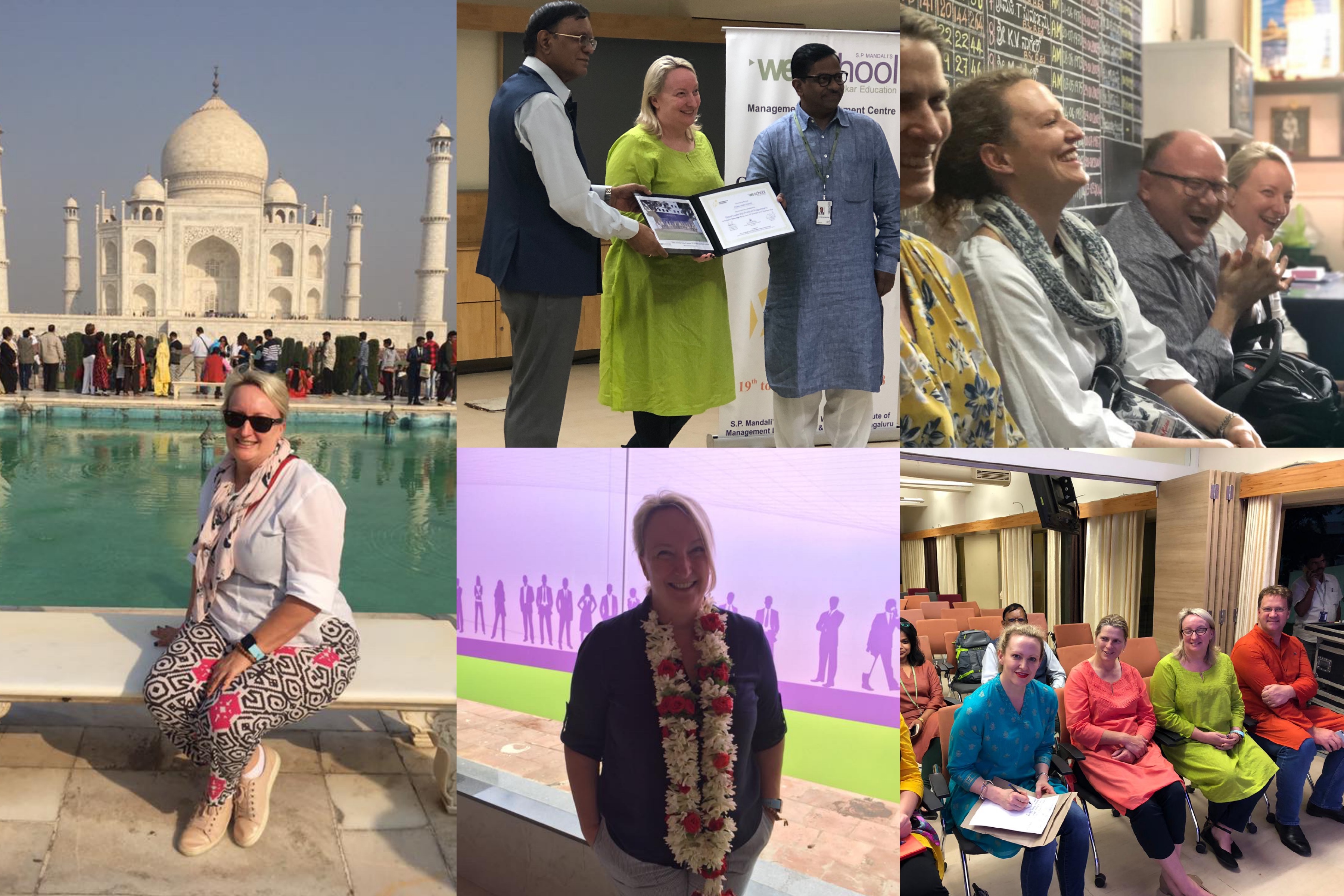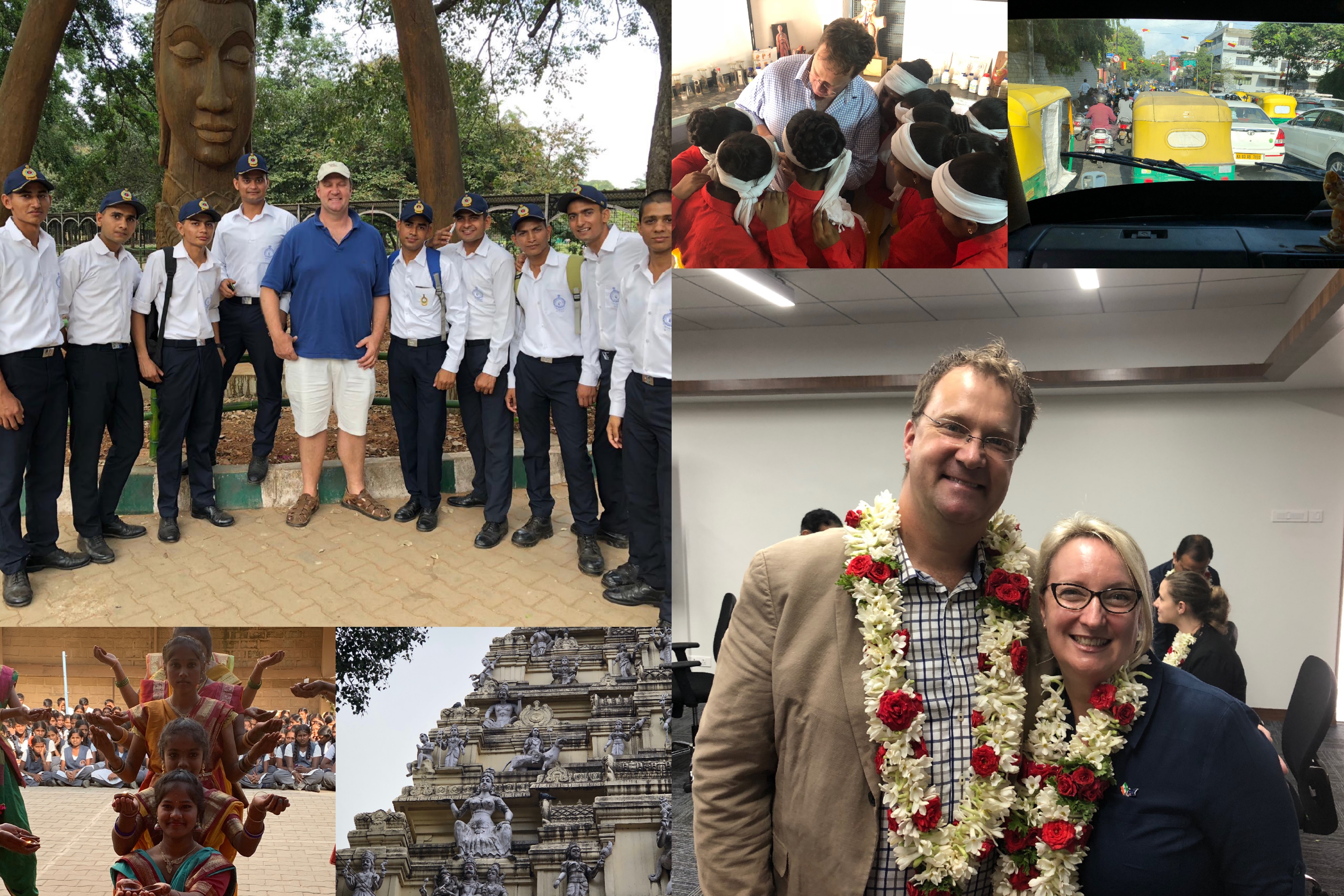In 2018, three Churchill Fellows were given an opportunity to participate in the Global Leadership Practices (GLP) Program, a leadership development program made possible by our partnership with Yellow Edge.
Fellows Tony Eyres and Fiona Hawthorne travelled to India and Fellow Emma Robinson visited China where they gained new perspectives and networks to continue their Churchill Fellowship journey. The inclusion of Churchill Fellows to the program added depth and breadth to the participant cohort.
Tony, Fiona and Emma shared with us their experiences of this unique opportunity.
TONY EYRES | GLP INDIA
Why did you decide to apply for the GLP Program in India?
To further my initial learnings from my Fellowship, in a different context or setting, being an emerging market like India. I also wanted the opportunity to share my learnings and experiences with a wider group of people, taking full advantage of the relationship between the Churchill Trust and program provider Yellow Edge.
Tell us about the experience. Did it meet your expectations?
It was an extraordinary week, with the initial sensory overload from all the sounds, the colours, the smells and novel ways of getting things done giving way to a deeper appreciation and warm affection for the people, places and experiences that are a part of India. It met my expectations in that it provided an insight into how India’s business and government functions while enlightening me on many elements of Indian culture, all in the relative comfort of a structured learning program.
How did it enable you to build on your Churchill Fellowship findings and/or your growth as a Churchill Fellow?
The overseas experience, as with any such opportunity to travel, added to the knowledge bank of thoughts, ideas, business opportunities and ways of dealing with barriers or challenges that you encounter in everyday life. The Program called on my communications and leadership skills in a diverse group of senior government officials, in a totally different environment than the familiar surrounds of Australia.
Which organisation, site visit or individual did you find to be most valuable on the program? and why?
Curiously, the opportunity to visit the home of Professor AKN Prasad, the key presenter and convenor of the We Business School program, together with the other program participants and some fellow academics from the School, to share a meal with his wife and 90+ year old mother. This delightful, family meal and the interaction with the Business School students at the closing presentation provided an opportunity to engage closely with Indians about their hopes and aspirations, both as individuals and for their country.
NB: Special mention should also be made of my fellow Fellow, Fiona Hawthorne, who helped me “keep it real” and behave as a Fellow should!
What was the most interesting thing you learned about India while on this trip?
Indians maintain a very positive disposition to life, often despite great hardship and limited individual opportunity due to circumstance. Having such a vast population presents many opportunities but also many challenges for India yet there seems an unwavering belief that each will be overcome, just not in the immediate term!
Any advice to Fellows looking to apply for the GLP Program in 2019?
Apply! I suggest applicants consider what is important in being a Fellow and ensure you share those attributes in your application. If successful, then share those attributes with others on the program. If successful, take full advantage of the opportunity that a travel experience such as this offers, being to learn more about another part of the world, another culture and to engage with a high calibre cohort of participants, most likely with very different backgrounds to yourself. Oh, and have fun! I certainly did.

FIONA HAWTHORNE | GLP INDIA
Why did you decide to apply for the GLP Program in India?
When the opportunity arose to apply, I reflected on my career to date, and how participating in this program, specifically India, would assist me in creating a strategically crafted platform from which to promote children’s palliative care. The end goal for me is to increase access to palliative care for children around the globe. In 2015, it was estimated that there were approximately 40 000 children diagnosed with cancer every year in India. Of these, some 2500 children under the age of 5 years will die.
Indian Palliative Care Physician, Dr M. R. Rajagopal estimates that more than 50% of children in India who are dying from cancer have received chemotherapy in the last week of life, thereby potentially increasing suffering. The opportunity for a child-focussed palliative care team to work with families prior to this is immense. There is clear evidence to support this from all around the world. It is my passion to continue my Churchill Fellowship in India because of the work done by Dr Rajagopal and his colleagues at Pallium India.
Tell us about the experience. Did it meet your expectations?
I went into the two-day primer filled with assumptions and expectations. I expected to be challenged by an expert, to have to work hard and do homework and reflective exercises. I was wrong. It was so much more than I thought or expected.
Firstly, the experience is about the individual. It is about looking within and learning, not being told. It is about immersing yourself in another country and culture to see what you think and feel. And then taking that back to your everyday. Be prepared to jump in. Ask questions. Reflect on the answers and what you see. It’s a smart and left-of-centre experience. There is no homework. There are no challenges except those you place on yourself.
It was a big week. A week where I learned a bit about myself, a lot about India and her culture. A week where I remembered what it was like to travel and see other parts of the world. It was a privilege, and I’m deeply grateful.
How did it enable you to build on your Churchill Fellowship findings and/or your growth as a Churchill Fellow?
The opportunity to meet with others, reflect on how we ‘do business’, and find commonalities between our two countries offered me a chance to reflect on my practice as a leader, how these can be challenged by stepping into not just another country but another culture.
To have the space and time away from my daily responsibilities afforded me the headspace to contextualise what sort of leader I am, what I need to learn, and how my colleagues in India address the same issues I do.
This program gave me unprecedented access to Indian officials and business leaders. Not to mention the opportunity to broaden my network here in Australia.
Which organisation, site visit or individual did you find to be most valuable on the program? and why?
Meeting with Infosys and the CEO and Whole-time Director U. B. Pravin Rao was outstanding. He is a true global leader. His ability to hear what we all did and have a meaningful comment to make about what he heard to be the challenges and rewards we each faced was remarkable. Each member of the group was able to take away a true pearl of wisdom.
What was the most interesting thing you learned about India while on this trip?
Working with and learning from the Yellow Edge team increased my self-awareness, helped me learn to navigate workplace complexities, and in turn become more influential in areas that are outside my comfort zone: business, finance and investment. For me, it was how to reframe my approach to the leadership of a growing team, and that was to ensure everyone understands how their role directly impacts on the delivery of care to families who live with and love a child with a life-limiting condition. The time spent at Infosys was worth the trip to India. I would never have been in front of such an experienced individual without the opportunity of being on the GLP.
Any advice to Fellows looking to apply for the GLP Program in 2019?
Be brave. Reflect on what you have achieved with your Fellowship, and how this experience can enhance that. I was fortunate enough to be able to take a holiday around the GLP week. This enabled me to network with other hospices in Bangalore, and also take a personal holiday in India. If you are successful, check your ego and assumptions. Listen to the group and learn from them. Simon and Victoria from Yellow Edge are experts both in leadership and the countries they visit. I learnt just as much from my colleagues over dinner as I did in the classroom or external organisations.
Apply! You have nothing to lose and an incredible amount to gain. If you’re heading to India, I did three weeks without even a whiff of Delhi belly. Happy to share my secrets.

EMMA ROBINSON | GLP CHINA
Why did you decide to apply for the GLP Program in China?
There is no doubt the future of China and Australia are intertwined. For me as a beef producer, the Chinese market provides an important and expanding customer base that we need to better understand. More generally though, I think it is important for all Australians to take opportunities to explore and interact with China. Understanding its history, culture and traditions mean we are better placed to interact and respond to its many opportunities and complexities.
Tell us about the experience. Did it meet your expectations?
I visited Shanghai without any pre-conceived ideas on what to expect. I enjoyed the opportunity immensely, the freedom to simply immerse yourself for a week, understanding the richness and complexity of China is an opportunity I won’t forget. The camaraderie of the group, and support and leadership from Simon and Victoria, made the week a great success. The program provides a great balance of information, insight and opinion from key experts on a range of topics from technology to education and agriculture with flexibility to explore the diversity of Shanghai at night and field trips that cut to the heart of the topics being discussed.
How did it enable you to build on your Churchill Fellowship findings and/or your growth as a Churchill Fellow?
GLP has helped me to gain a better understanding of the complexities of doing business in China and some of the parameters from a Government and cultural perspective. I used the trip to gain insight into the Shanghai market place and build insights around some of the leading trends in the retailing and marketing of beef.
Which organisation, site visit or individual did you find to be most valuable on the program? and why?
The opportunity to participate in round table discussions with mid-level professionals from Government and the commercial field was invaluable. We had the opportunity to ask specific questions relating to their roles, backgrounds and opinions on a range of issues. It was also great to get an insight into their day to day lives, working and living in Shanghai.
What was the most interesting thing you learned about China while on this trip?
Listening to the different perspectives of other participants on GLP. Because we all came from different backgrounds and interests, there was great value in talking through insights and ideas, and building a better understanding of implications and opportunities.
Any advice to Fellows looking to apply for the GLP Program in 2019?
GLP provides the change to do a deep dive into better understanding the Chinese trajectory from its rich history, to modern day China and future aspirations. You will have exposure to a rich cross section of expert speakers who are open to sharing their thoughts, insights and discussing some of the tough issues around Australian and Chinese relations.
